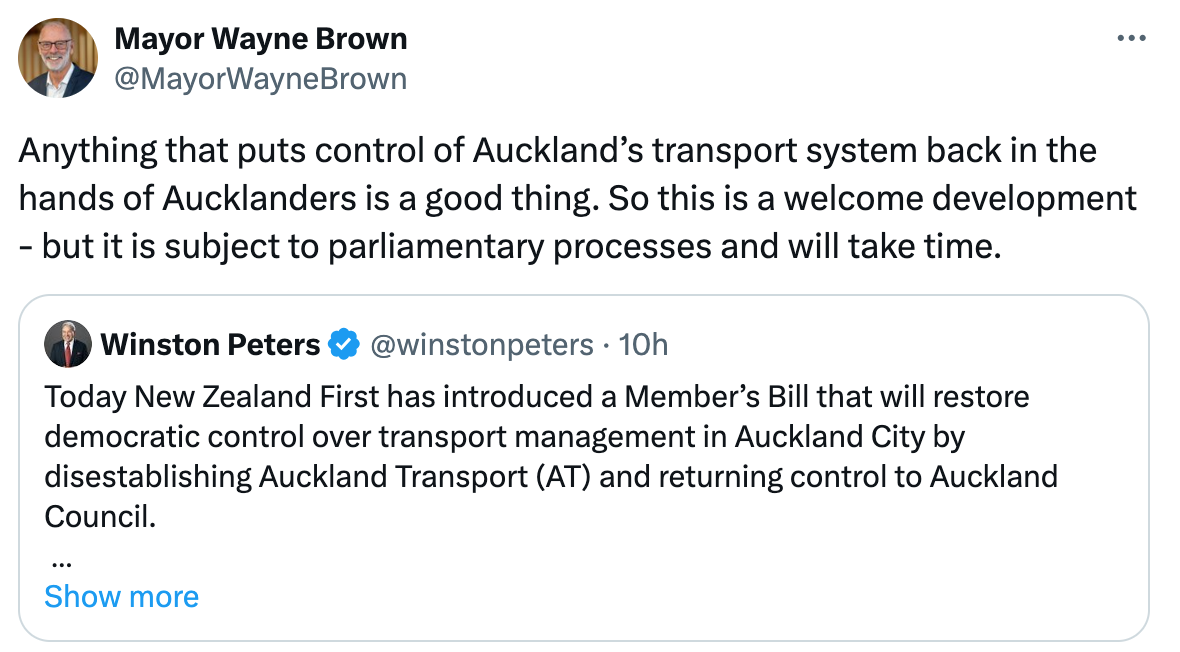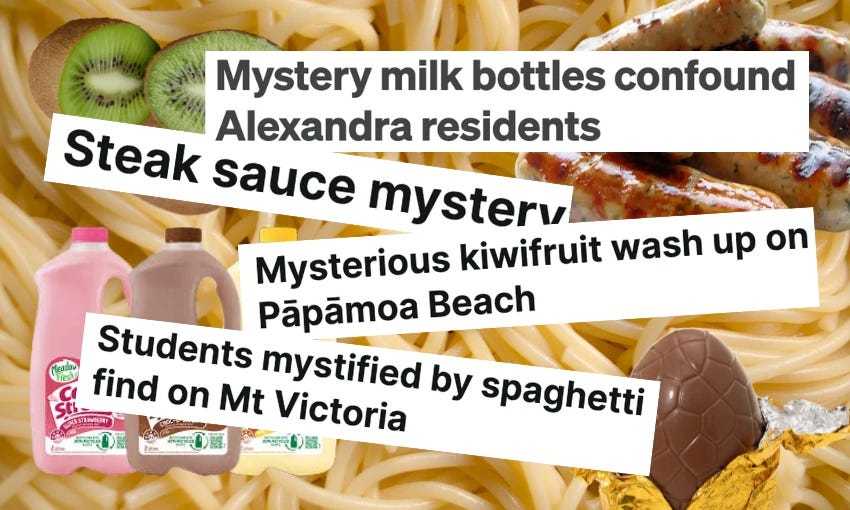Petrol, parking, public transport: Change is on the way for our roads
And how we pay for them.
Mōrena, and welcome to The Bulletin for Friday, August 30.
In today’s edition: Māori King Tūheitia has died suddenly at the age of 69 just days after fronting Koroneihana commemorations, why Australia’s prime minister has called out a New Zealand journalist, and four mines were among the projects identified for fast-tracking by NZ First before last year’s election. But first: breaking down a range of transport announcements that were made yesterday.
Petrol tax could be gone by 2027
When launching his government’s latest quarterly action plan back in July, Christopher Luxon named addressing the cost of living as a top priority – but said that to achieve that, “you gotta get modern infrastructure in place”. Nearly two months into that plan, we’re starting to see a number of those goals become reality. It’s been a busy week for the government. We’ve talked about some of what has been announced already – like the backdown on ministerial sign-off in the forthcoming fast-track consenting laws. But yesterday saw a flurry of stories around transport.
In a speech to the Building Nations conference in Auckland, transport minister Simeon Brown announced a new Revenue Action Plan, a roadmap teeing up a possible overhaul of transport funding that would see petrol car drivers pay road user charges in lieu of fuel tax, reported RNZ’s Craig McCulloch. According to the new action plan, which has been welcomed by transport advocates, legislation could be introduced next year that will see all light vehicles charged road user charges by 2027. The government has previously indicated a petrol tax hike for that same year, as Amelia Wade reported for Newshub in June, suggesting there are a few more details to be ironed out before anything starts to change.
It’s part of a broader user pays model
Petrol taxes and road user charges contribute to the National Land Transport Fund and aid with road construction and upkeep. But in his speech, reported BusinessDesk’s Oliver Lewis (paywalled), Brown questioned the sustainability of that fund and that model. “We have inherited a transport system in need of investment, without the appropriate funding tools to pay for it,” the minister said. That’s nothing new – Treasury made note of pressure on the transport fund to the former government before last year’s budget, reported Newsroom’s Emma Hatton at the time.
To address this, the government has already made clear that it sees a future with new sources of revenue, road tolling being central to this. Brown referred to motorists as “customers” in his speech yesterday, adding that customers “expect and demand the highest level of service”. In July, Brown said that all of the government’s new roads of national significance could be tolled and, just this week, indicated the new Penlink highway may potentially incur a user fee. Meanwhile, so-called “congestion charges” are also on the (quite distant) horizon in cities like Auckland and Wellington, though as Glenn McConnell at Stuff explained, it will require cooperation between local councils, the transport agency and cabinet.
Get ready to be pinged more for a parking ticket
Also yesterday, the government announced plans to push ahead with a long-touted update to parking fines. I reported on this for The Spinoff last year, with the Labour government confirming it had bumped a planned hike to parking fines as a result of the cost of living crisis. Parking fines haven’t been adjusted for over 20 years, meaning it can sometimes be cheaper to risk being ticketed and forego paying for parking at all – something Auckland’s mayor Wayne Brown told RNZ’s Lisa Owen made “no sense”.
The knotty issue here is that while councils can set the cost of parking, they don’t have control over how much the fines should be. That’s set by legislation, which is why the government is finally stepping in to bring parking infringements in line with inflation. It will mean an increase of about 70%, reported the Herald’s Jamie Ensor. One significant hike will be for drivers caught illegally parking in a disabled carpark. Currently, that would result in a $150 fine but this will soon be increased significantly up to $750 – it seems unlikely anyone will argue that’s unfair. Disability issues minister Louise Upston said that misusing disability carparks was the “epitome of arrogance” and the current penalty was far too low.
Are Auckland Transport’s days numbered?
Another wish of Wayne Brown’s may also be in the pipeline, though it will require some political manoeuvring to become a reality. As Oliver Lewis reported (paywalled), New Zealand First has put forward a member’s bill that would abolish Auckland Transport and have the organisation’s functions returned to the council. Being a member’s bill, this doesn’t instantly mean it has the government seal of approval – though Winston Peters is a fan – and it would have to be randomly drawn from the ballot to even be debated.
Nevertheless, Auckland’s mayor has already been vocally advocating for this, having publicly admonished the council-controlled organisation on several occasions – including yesterday, telling a crowd in Auckland that AT “simply has too much power”. Earlier this month, Brown told Newstalk ZB’s Heather du Plessis-Allan he wanted to see AT stripped of its policymaking functions, while the appointment of the “pro-car” councillor Maurice Williamson to AT’s board is said to be part of the mayor’s plans to take some control of the organisation. Taking to Twitter, Brown called New Zealand First’s bill a “welcome development”.
Show your support, join up today!
"As a New Zealander living in Sydney, The Spinoff helps me to feel in touch with what's happening back home. There's a great breadth to the content – and the enthusiasm from your contributors is palpable. I feel happy and proud to be a member." Ian, Sydney.
Whether living here or abroad, if you value our work please show your support by becoming a member today.
‘A moment of great sadness’: Māori King Tūheitia dies
In breaking news this morning, Māori King Tūheitia has died suddenly at the age of 69, RNZ reported. It comes just days after Koroneihana, commemorations to celebrate Tūheitia’s coronation. A statement issued by the office of the Kīingitanga said Tūheitia passed away peacefully after recovering from heart surgery in hospital. "The death of Kiingi Tūheitia is a moment of great sadness for followers of Te Kīingitanga, Maaoridom and the entire nation,” reads the statement. The death of King Tūheitia will trigger a period of mourning, with the king to lie in state for five days at Turangawaewae Marae before being taken to his final resting place. Kīingitanga chief of staff Ngira Simmonds has just told RNZ’s Morning Report that a successor will be decided by a group of leaders within the Kīingitanga movement.
Traditionally a figurehead, Tūheitia’s role became increasingly political in recent years. In January, as many as 10,000 people came together at Tuurangawaewae for a national hui which The Spinoff’s Tommy de Silva described as a “tikanga-based, future-focused, all-ages event for people to koorero and waananga about how to hold the government to account”. This is a developing story and details are currently limited, however tributes to the King and information on a formal farewell will continue to trickle in throughout the coming day. Acting prime minister Winston Peters will do the media round this morning on behalf of the government.
Listen: Building better goal posts
Accountants often have low profiles and their accounts seem merely to keep score on the games of capitalism, but they can sometimes shape capitalism itself, and maybe even the atmosphere.
Bernard Hickey talks with Dr Amelia Sharman from the External Reporting Board, a usually obscure setter of accounting standards nestled somewhere between the government and companies. She details how the XRB’s new standards for emissions accounting might just change the world.
Listen below or wherever you find your pods.
Australian PM takes aim at New Zealand journalist
Australia’s prime minister Anthony Albanese has been caught up in what’s being described as a “hot mic” situation, taking aim at the New Zealand journalist that recorded the footage. While at the Pacific Islands Forum in Tonga alongside fellow world leaders, RNZ reporter Lydia Lewis captured a conversation between Albanese and US deputy secretary of state Kurt Campbell in which the Australian leader joked about splitting the cost – or going “halfsies” – of a Pacific Policing Initiative. The interaction has been picked up by most of Australia’s media and, when asked about it, Albanese questioned the “ethics” of Lewis for taping the conversation, reported the Financial Review.
Meanwhile, our own prime minister Christopher Luxon has been on the ground in Tonga as well. Thomas Manch at The Post reported on the PM’s quest for “centrality” at the forum and analyses what that would take.
“As I’ve become older, my body changes and I have to figure out, ‘Do I want to continue to do this?’ One thing that keeps me going is that I feel it’s important to see women of all ages on stage.”
Dance, performance, video art, animation, painting, drawing: Louise Pōtiki Bryant does it all, creating dance art that blends her various modes of expression into one spectacular whole. She tells us about her unique art practice in the new edition of Art Work. Read it here. (sponsored)
Click and Collect
Two coal mines and two gold mines were among the projects identified for fast-tracking by NZ First before the election and taken to coalition negotiations.
University of Auckland academics in “unprecedented” revolt over controversial course shake-up.
Business confidence hit a decade high in a month in which the Reserve Bank cut interest rates.
It’s 50 years ago today that prime minister Norman Kirk died. For subscribers of Politik, I enjoyed this interview with Labour’s current leader Chris Hipkins reflecting on Kirk’s legacy and what role it can play for the current iteration of the party. The Herald’s daily podcast The Front Page also has a story on Kirk.
An interesting report from The Post’s Tom Hunt looking at the behind-the-scenes wrangling in Wellington to get the Reading deal done – including a vote only to be held in public if the mayor would win.
New Plymouth MP “hugely relieved” after police end investigation.
The attorney-general Judith Collins will have a word with her colleague Shane Jones after he made a second crack at the judiciary.
A special meeting set to consider whether the Greens should try and “party hop” Darleen Tana out of parliament has been called off after the independent MP began legal proceedings.
Take part in The Spinoff survey for a chance to win one of three $400 Prezzy Cards! Your feedback is crucial to us, and as an independent media company, we're committed to making your experience even better. The survey is quick, anonymous, and we’ll only use your email for the prize draw. Don’t miss out — ends this Saturday. Click here to have your say and enter the draw!
Alex Casey walks through a brief history of New Zealand’s weirdest mystery food dumps, from mailbox sausages to one giant ham. What you see on television is merely a fraction of the magic and mayhem of parliament’s question time, writes Lyric Waiwiri-Smith. Ahead of the return of Amazon’s formerly-shot-in-New Zealand Rings of Power, Dominic Corry speaks to the cast about how much they miss us. Liam Rātana writes on the power in changing your name. It’s time to cut the crap on gene technology, argues molecular biologist Jack Heinemann. And in the latest edition of Help Me Hera (fresh off a successful live debut* in Auckland last night), Hera Lindsay Bird answers: am I too old for dating apps?
*Looking for more events in The Spinoff Live series? Check them all out here.
That’s it for another week, thanks for reading. I’ll be back on Monday.
Want to get in touch? Join the conversation in the Substack comments section or via email at thebulletin@thespinoff.co.nz if you have any feedback on today’s top stories (or anything else in the news).
If you liked what you read today, share The Bulletin with friends, family and colleagues.



















We are not “customers” on our OWN roads. What an insulting comment, and a showing of Simple Simeon’s true colours - that we are simply cash cows to be squeezed.